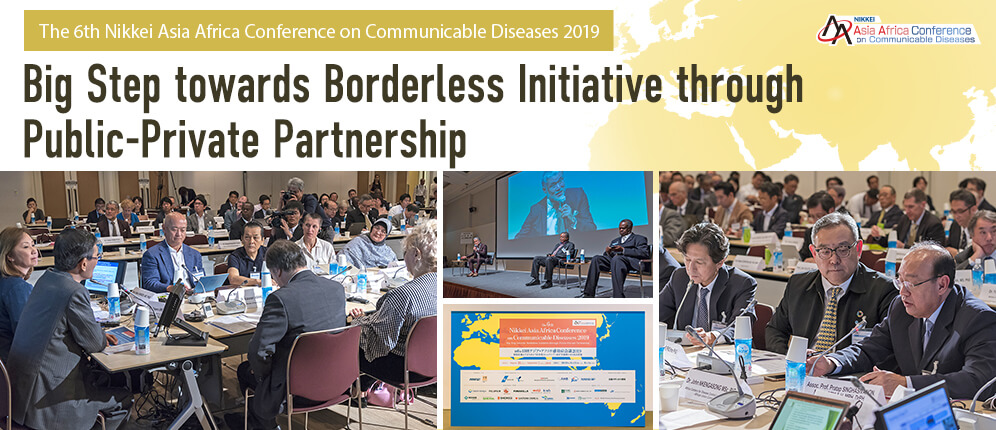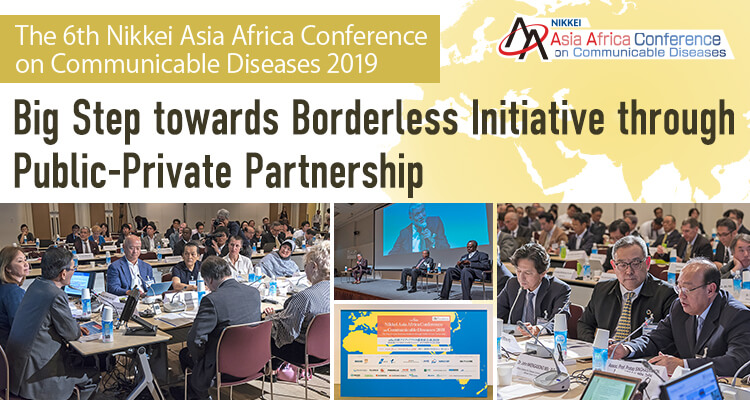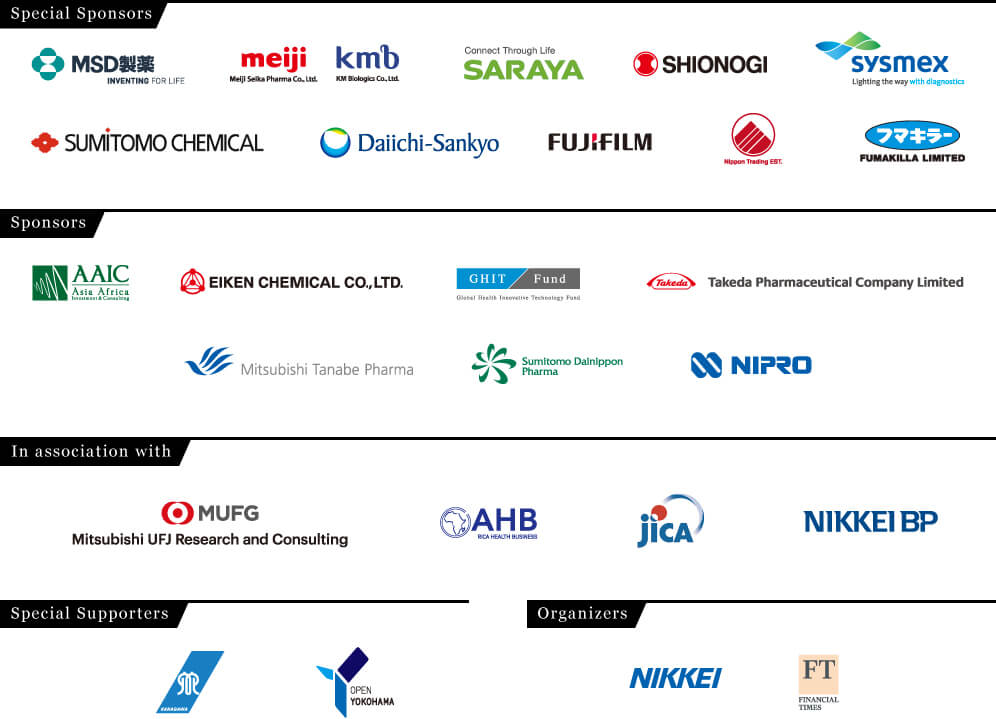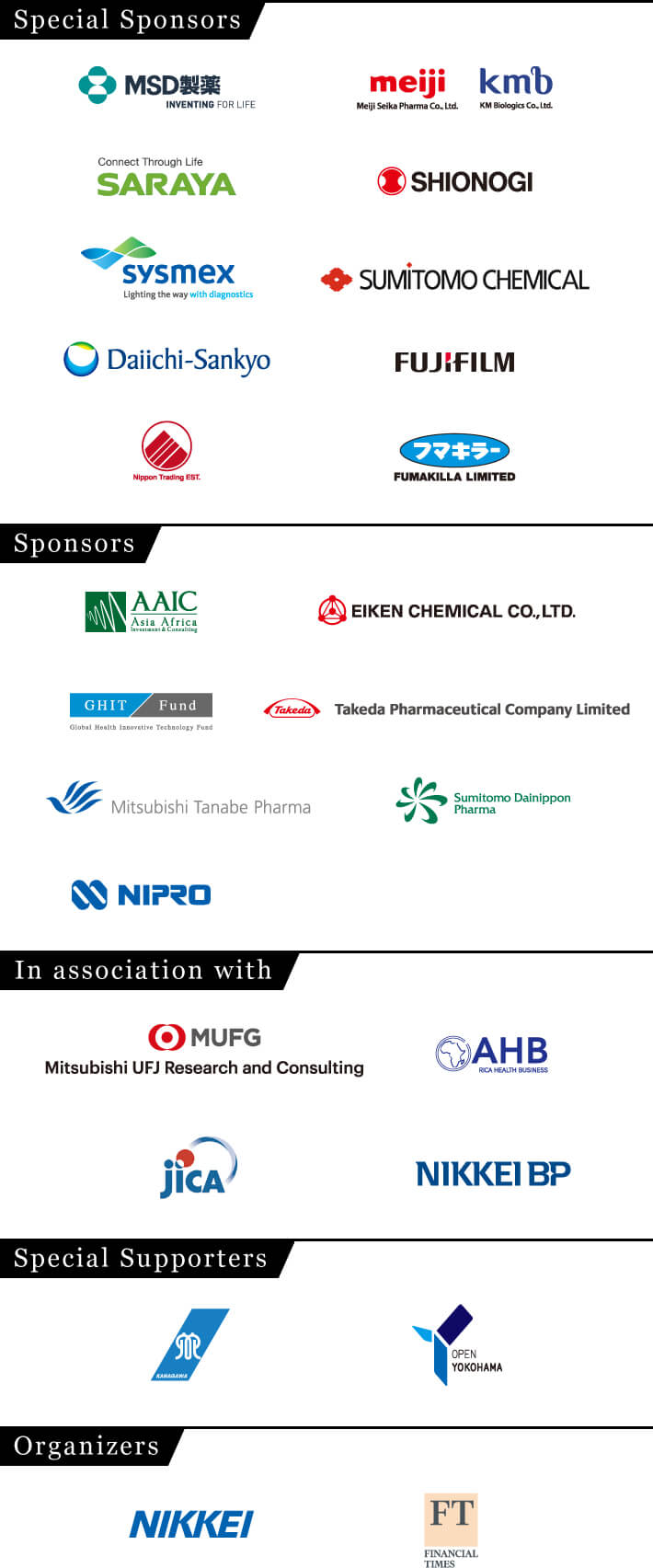OVERVIEW
The 6th Nikkei Asia Africa Conference on Communicable Diseases, organized by the Nikkei and the Financial Times in conjunction with special supporters Kanagawa Prefecture and Yokohama City, was held over two days from August 31 to September 1 2019, at the Pacifico Yokohama convention center in Yokohama’s Minatomirai district.
Asian countries, whose economies continue to grow, are becoming an increasingly influential presence in international society, while African nations are establishing active relations with other countries around the world anticipating strong future growth in the continent. However, communicable diseases remain a serious threat in these regions, and combating this risk has become one of the most important challenges for international society as a whole, including Japan.
Based on this awareness, Nikkei Inc. has held the annual Nikkei Asian Conference on Communicable Diseases since 2014, gathering all stakeholders from industry, government and academia, including internationally renowned experts in the field from both within and outside Japan, international organizations and government bodies working to tackle communicable diseases, and representatives from academia and the private sector.
In the conference’s sixth year, the scope was widened to Africa and the event renamed the "Nikkei Asia Africa Conference on Communicable Diseases" (previously named the "Nikkei Asian Conference on Communicable Diseases") in recognition of the fact that the framework of proposals at the conference related to communicable diseases was beginning to extend to Africa. Accordingly, the conference was held in conjunction with the 7th Tokyo International Conference on African Development (TICAD7), which was held in Japan for the first time in three years, in the same host city of Yokohama.
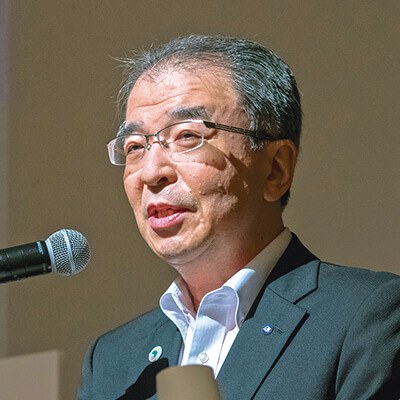
Opening Remarks
Mr.Katsunori Watanabe
Deputy mayor
City of Yokohama
Mr. Katsunori Watanabe, Deputy Mayor of Yokohama City, who gave the opening address at the conference, spoke of Yokohama’s history as a port city which opened its doors to the world some 160 years ago, detailing how the city had established quarantine stations to prevent the spread of communicable diseases, how pioneering Japanese bacteriologist Hideyo Noguchi was involved, and how the Yokohama of today serves as one of Japan’s leading research and innovation center through institutions such as RIKEN Yokohama Campus and Yokohama City University, before concluding by expressing his high hope and expectation for the event.
The main topics of discussion at the conference are how to implement effective measures against the global threat posed by communicable diseases, and the role Japan should play in achieving this goal, and the event aims to share issues and propose countermeasure projects related to specific topics such as malaria and tuberculosis. At the conclusion of each conference a statement named after the host city is released.
International cooperation amidst economic disparities and differences in governmental systems can only succeed with strong government support. Accordingly, since the inaugural conference in 2014, the conference has established the Public-Private Partnership (PPP=P3) as an integrated public-private cooperative framework for creating proposals and implementing initiatives, and discussion has centered on the potential for the construction of P3 initiatives on each topic.
Although the conference itself is held once per year, the Asia Africa Medical Innovation Consortium (AMIC) comprised of several working committees, operates throughout the year to put proposed projects into action and ensure that initiatives are followed up.
The keynote speeches at the beginning of the event were delivered by the winners of the Third Hideyo Noguchi Africa Prize awarded by the Japanese government: Dr. Jean-Jacques Muyembe-Tamfum, General Director of Democratic Republic of the Congo National Institute for Biomedical Research (INRB) and Professor of Microbiology at the University of Kinshasa, and Dr. Francis Gervase Omaswa, Executive Director and founder, African Centre for Global Health and Social Transformation (ACHEST). Dr. Muyembe-Tamfum reported on the current situation in the Democratic Republic of the Congo, which is in the midst of its tenth Ebola outbreak, providing a real-time account of the current state from his perspective as leader of the crisis response. Meanwhile, Dr. Omaswa outlined his efforts to create a pool of health care personnel in Africa despite a range of challenges such as conflict and friction.
The program subsequently moved to topic-based sessions in which a broad range of topics were discussed, from the threat posed by the Ebola virus, malaria, tuberculosis, and antimicrobial resistance (AMR), to the establishment of clinical research platform in disease-stricken regions - which are essential to the development of drugs used in treatment and testing - and universal health coverage (UHC) systems that allow the economically disadvantaged to receive healthcare services.
A particular focus of attention was a session which focused on the establishment of a clinical research platform in Asia. AMIC's Asia Clinical Trials Platform Working Group introduced the "Plan for Establishment of a Clinical Trials Platform in Asia" proposal that was submitted to government in June 2019, outlining the plan's details as well as its background. Although the plan is currently awaiting feedback from respective government, once this is obtained a range of actions will be deployed, including construction of sites in Thailand and Indonesia.
In addition, participants agreed to establish a P3 Project for AMR in addition to those for Ebola, malaria, and tuberculosis, and to work to build a UHC model designed for implementation in Africa.
The common understanding of the current situation and issues obtained from the two days of discussion at the conference as well as proposed action plans were compiled into the Yokohama Communicable Diseases Statement 2019 and published with the agreement of participants. In addition to the output of the conference being reported at related government meetings, the document will be broadly communicated to the world's international organizations as a further declaration of Japan's commitment to combating global communicable diseases.
Yokohama Communicable Diseases Statement 2019 (Summary)
The 6th conference was held in conjunction with the TICAD 7. This provided the opportunity for discussions on expanding various scopes of collaboration beyond Asia including Africa, and with UHC among the themes, the contribution to the health care systems of many African countries that have many issues was also discussed. Also, regarding the creation of the Asia Clinical Trials Platform that has been proposed by the Nikkei Asia Africa Conference on Communicable Diseases, agreement of the conference participants was unanimous. Furthermore, measures against AMR were launched as a new P3 project. The endeavors to tackle communicable diseases (tuberculosis, malaria, Ebola, etc.) through P3 projects presented by the conference had produced some good results in a short period of time, which confirmed that infection control measures by P3 are effective.
However, there are still issues that have to be overcome in measures against communicable diseases carried out by P3. If Africa is included in the field of view regarding the risks and importance of measures against neglected tropical diseases (NTDs) which have not yet occurred in Japan, as communicable diseases know no borders, it is essential to raise public awareness in Japan and by doing so raise political attention. Through further strengthening collaboration among stakeholders in Japan and other countries, through P3 efforts, concrete progress is expected to be made by the time of the 7th conference in various actions included in the current statement that need to be acted on.
Posts and titltes are those as of the time of the event
